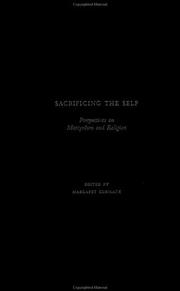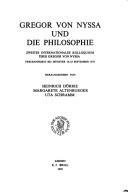| Listing 1 - 10 of 850 | << page >> |
Sort by
|
Book
ISBN: 9780814760840 0814760848 9780814724323 0814724329 9780814770108 081477010X 0814770630 9780814770634 Year: 2017 Publisher: New York : New York University Press,
Abstract | Keywords | Export | Availability | Bookmark
 Loading...
Loading...Choose an application
- Reference Manager
- EndNote
- RefWorks (Direct export to RefWorks)
What are the sacraments? For centuries, this question has elicited a lively discussion and among theologians, and a variety of answers that do anything but outline a unified belief concerning these fundamental ritual structures. In this volume, a group of renowned scholars map the theologies of sacraments offered by key Christian figures from the Early Church through the 21st century. Together, they provide a guide to the variety of views about sacraments found throughout Christianity, showcasing the variety of approaches to understanding the sacraments across the Catholic, Protestant, and Orthodox faith traditions.
Sacraments --- History of doctrines --- History of doctrines.
Book
ISBN: 9780511975875 0511975872 1107486726 0511975872 9780521877398 9780521701136 Year: 2011 Publisher: Cambridge : Cambridge University Press,
Abstract | Keywords | Export | Availability | Bookmark
 Loading...
Loading...Choose an application
- Reference Manager
- EndNote
- RefWorks (Direct export to RefWorks)
How do Christians reconcile their belief in one God with the concept of three divine 'persons'? This Companion provides an overview of how the Christian doctrine of the Trinity has been understood and articulated in the last two thousand years. The Trinitarian theologies of key theologians, from the New Testament to the twentieth century, are carefully examined and the doctrine of the Trinity is brought into dialogue with non-Christian religions as well as with other Christian beliefs. Authors from a range of denominational backgrounds explore the importance of Trinitarian thought, locating the Trinity within the wider context of systematic theology. Contemporary theology has seen a widespread revival of the doctrine of the Trinity and this book incorporates the most recent developments in the scholarship.
Book
ISBN: 0813232864 9780813232867 9780813232850 0813232856 Year: 2020 Publisher: Washington, D.C. : The Catholic University of America Press,
Abstract | Keywords | Export | Availability | Bookmark
 Loading...
Loading...Choose an application
- Reference Manager
- EndNote
- RefWorks (Direct export to RefWorks)
Since the twelfth century, theologians have found a counterfactual question irresistible: "If Adam had not sinned, would the Son have become incarnate?" In the latter half of the twentieth century, Hans Urs von Balthasar, Hans Küng, Gerhard Ludwig Müller, Karl Rahner, Karl Barth, Wolfhart Pannenburg, Jürgen Moltmann, and Robert Jenson all considered this question on the reason, or motive, for the incarnation. Nearly every case refers to the classic disagreement between those who follow Thomas Aquinas and those who follow John Duns Scotus. Though it is common to claim Thomas or Scotus as one's authority, the theological debates among which Thomas and Scotus developed their own positions remain largely neglected. This study fills that gap. If Adam Had Not Sinned is a study of the medieval debates over the motive for the incarnation from Anselm of Canterbury to John Duns Scotus. While the volume is primarily focused on thirteenth-century debates at the University of Paris, it also supplies necessary historical background to those debates. As a result, the larger context within which Thomas Aquinas and John Duns Scotus developed their influential responses is detailed. This larger context permits an analysis that leads to the surprising claim, against widespread assumptions, that the responses given by Thomas and Scotus are substantially reconcilable.
Book
ISBN: 9789004467668 9789004467651 Year: 2021 Publisher: Leiden;Boston Brill | Nijhoff
Abstract | Keywords | Export | Availability | Bookmark
 Loading...
Loading...Choose an application
- Reference Manager
- EndNote
- RefWorks (Direct export to RefWorks)
Book
ISBN: 9783846765425 9783770565429 Year: 2023 Publisher: Paderborn Ferdinand Schöningh, Brill | Fink
Abstract | Keywords | Export | Availability | Bookmark
 Loading...
Loading...Choose an application
- Reference Manager
- EndNote
- RefWorks (Direct export to RefWorks)
Im zweiten Band seiner umfassenden Post-Systematischen Theologie auf Basis einer phänomenbasierten, narrativen Ontologie behandelt Mühling das trinitarische Liebesabenteuer Gottes von der Gotteslehre bis zur Hamartio logie. Innerhalb des Liebesabenteuers werden die Differenz in Gott in Form seiner dreifachen Personalität, Gottes narrative Einheit und Gottes Werdensei genschaften behandelt. Der Schöpfungsweg behandelt Gottes Fähigkeit zur Schöpfung, creatio ex nihilo und creatio continuata, die Schöpfung als imago trinitatis, Kosmologie, wirkliche Möglichkeiten, Engel und Außerirdische sowie biologische Evolution. Die Anthropologie des menschlichen Werdens inmitten der Geschöpfe behandelt den Menschen als imago personalitatis, seinen ausgedehnten Geist und sein leibliches »Seelen«, Vernunft, Wille und Affektivität, den menschlichen Prozess des Humaning, die Erschöpflichkeit seiner Geschöpflichkeit und eine umfassende Explikation der Sünde als Ver-rücktheit des Menschen im geschaffenen Gewebe. Der Band schließt mit Überlegungen zu einem ökologischen Ethos der Geschöpflichkeit. Stets spie len interdisziplinäre Überlegungen, v.a. zwischen Theologie, Philosophie und den Naturwissenschaften, eine wichtige Rolle.

ISBN: 1281346632 0198034164 1423726987 9781423726982 9780198034162 9780195149999 0195149998 9780195150001 0195150007 9781281346636 9786611346638 6611346635 0190287683 Year: 2001 Publisher: Oxford ; New York : Oxford University Press,
Abstract | Keywords | Export | Availability | Bookmark
 Loading...
Loading...Choose an application
- Reference Manager
- EndNote
- RefWorks (Direct export to RefWorks)
Dying for one's God is one of the most difficult concepts for modern observers of religion to understand. This book seeks to foster a greater understanding of religious martyrdom by explaining how it has been viewed in the world's major religions. The book spans 4000 years of history.
Martyrdom. --- Martyrdom - History of doctrines. --- Martyrdom --- History of doctrines.
Book
ISBN: 9789004257719 9789004258143 9004258140 1299975933 9781299975934 9004257713 Year: 2013 Publisher: Leiden [Netherlands] : Brill,
Abstract | Keywords | Export | Availability | Bookmark
 Loading...
Loading...Choose an application
- Reference Manager
- EndNote
- RefWorks (Direct export to RefWorks)
In A New Apophaticism Susannah Ticciati draws on Augustine to develop an apophatic theology for the twenty-first century. Shifting the focus away from the potential and failure of words to say something about God, the book suggests that the purpose of God-language is to transform human beings in their relationship with God. Augustine's doctrine of predestination is read, with the help of speech-act theory and the study of indexicals, for its power to effect redemptive change; and his De doctrina christiana is drawn upon for its semiotics. Together they make way for the hypothesis that God-language transforms human beings into better signs of God.
Negative theology --- Christianity --- History of doctrines --- Augustine, --- History of doctrines.

ISBN: 9004043772 9789004043770 9004677216 9789004677210 Year: 1976 Publisher: Leiden ;Boston Brill
Abstract | Keywords | Export | Availability | Bookmark
 Loading...
Loading...Choose an application
- Reference Manager
- EndNote
- RefWorks (Direct export to RefWorks)
Book
ISBN: 1532657919 9781532657917 1532657897 9781532657894 Year: 2018 Publisher: Eugene, Oregon : Wipf & Stock,
Abstract | Keywords | Export | Availability | Bookmark
 Loading...
Loading...Choose an application
- Reference Manager
- EndNote
- RefWorks (Direct export to RefWorks)
Book
ISBN: 0830871934 9780830871933 9780830840335 Year: 2014 Publisher: Downers Grove, Illinois : InterVarsity Press,
Abstract | Keywords | Export | Availability | Bookmark
 Loading...
Loading...Choose an application
- Reference Manager
- EndNote
- RefWorks (Direct export to RefWorks)
John Howard Yoder, author of The Politics of Jesus, was best known for his writing on Christian pacifism. This volume--based on lectures recorded in 1973--shows he was a profound missiologist as well. Yoder weaves together biblical, theological, practical and interreligious reflections to think about mission beyond Christendom.
Missions --- Theory --- History of doctrines
| Listing 1 - 10 of 850 | << page >> |
Sort by
|

 Search
Search Feedback
Feedback About UniCat
About UniCat  Help
Help News
News